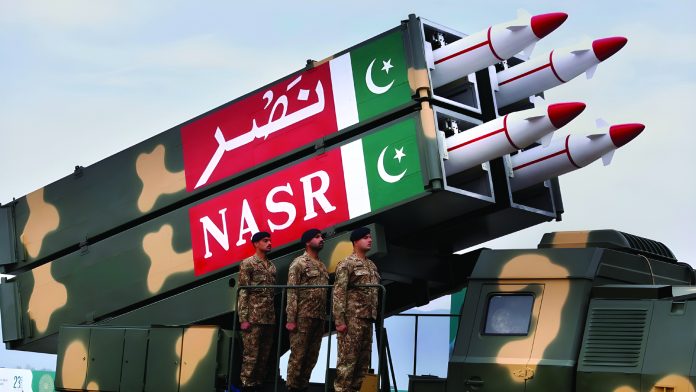In a move that has sparked intense debate and drawn criticism from various quarters, the United States recently imposed sanctions on Pakistan’s National Development Complex (NDC) and three associated commercial entities. Citing their alleged contribution to Pakistan’s ballistic missile program, this action is part of a broader narrative that unfairly singles out Pakistan’s legitimate efforts to strengthen its defense capabilities. These sanctions, which Pakistan has strongly condemned, represent a biased approach to global strategic dynamics and undermine the principles of fairness and equity in international relations.
Pakistan’s Ministry of Foreign Affairs (MoFA) has categorically rejected these sanctions, terming them “unilateral and politically motivated.” Islamabad has reiterated its unwavering commitment to non-proliferation and international peace. The entities in question are engaged in activities within the bounds of international law and adhere to Pakistan’s stringent regulatory framework. By targeting Pakistan’s missile program, the U.S. is ignoring the reality of Pakistan’s regional security environment, which necessitates a robust defense posture to counter persistent threats.
A senior U.S. official’s assertion that Pakistani missiles could potentially strike targets within the United States is not only alarmist but also misleading. In fact, strategic needs rather than expansionist ambitions guide Pakistan’s missile development. This rhetoric fuels misconceptions and detracts from the real challenges facing global non-proliferation efforts.
The U.S. has long been criticized for its selective application of sanctions and preferential treatment of certain states. While Pakistan faces punitive measures for developing indigenous defense capabilities, other states with aggressive postures and questionable non-proliferation records often escape scrutiny. This hypocrisy is starkly evident in the South Asian context, where Pakistan’s eastern neighbor enjoys unbridled access to advanced military technology and weapon systems without facing comparable restrictions or accountability.
Such an approach undermines the credibility of global non-proliferation regimes. By turning a blind eye to the arms buildup in Pakistan’s neighborhood, the U.S. sanctions appear less about curbing proliferation and more about exerting undue pressure on Islamabad. This selective enforcement erodes trust and reinforces perceptions of bias in international diplomacy.
Pakistan’s missile program is an integral component of its national security framework. Surrounded by a volatile region and facing a persistent threat from an adversary with superior conventional capabilities, Pakistan’s development of a credible deterrence is a strategic necessity. The country’s missile capabilities are not an offensive tool but a means of ensuring stability and deterring aggression.
Over the years, Pakistan has demonstrated its commitment to responsible defense development. Robust command and control mechanisms meticulously govern its missile program to maintain regional balance. Furthermore, Pakistan has consistently advocated for arms control and disarmament initiatives in South Asia, including the establishment of a Strategic Restraint Regime, which has been met with indifference or outright rejection from its eastern neighbor.
The imposition of these sanctions is likely to strain the already fragile U.S.-Pakistan relationship. At a time when global challenges such as climate change, economic instability, and terrorism demand collaborative efforts, punitive measures like these serve to deepen mistrust and diminish avenues for constructive engagement. Pakistan’s cooperation has been pivotal in addressing shared challenges, and alienating a key regional player is counterproductive to U.S. interests.
Moreover, these sanctions come when Pakistan actively seeks to diversify its foreign policy engagements. Islamabad’s growing partnerships with China, Russia, and other global powers signal a shift towards a more balanced and independent foreign policy. Actions such as these sanctions may accelerate this shift, pushing Pakistan further into the orbit of alternative alliances.
Pakistan’s response to these sanctions has been measured yet firm. By underscoring its commitment to non-proliferation and emphasizing the defensive nature of its missile program, Islamabad has highlighted the unjust and discriminatory nature of the U.S. actions. Pakistan must continue articulating its stance on global platforms and engaging with like-minded nations to counter this narrative.
At the same time, the U.S. must recognize the counterproductive nature of its approach. A fair and balanced policy that acknowledges Pakistan’s legitimate security concerns and supports regional stability is essential for fostering trust and cooperation. Addressing the root causes of regional tensions and promoting equitable arms control measures are far more effective pathways to achieving lasting peace than imposing unilateral sanctions.
The U.S. sanctions on Pakistan’s missile program reflect a flawed and biased perspective that fails to account for the complexities of regional security dynamics. Pakistan’s strategic decisions are driven by the need to safeguard its sovereignty and maintain a credible deterrent against existential threats. By targeting these legitimate efforts, the U.S. risks undermining the very principles it claims to uphold.
Pakistan is a responsible nuclear power, as evidenced by the robust safety measures governing its nuclear program and its consistent efforts to combat terrorism. The imposition of sanctions on Pakistan without credible evidence, while turning a blind eye to the nuclear proliferation by its eastern neighbor, underscores the fact that these sanctions are merely a coercive tactic employed by the United States.







